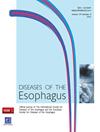554. SHORT TERM OUTCOMES OF ESOPHAGECTOMY FROM LOW VOLUME CANCER CENTRE IN INDIA
IF 2.3
3区 医学
Q3 GASTROENTEROLOGY & HEPATOLOGY
引用次数: 0
Abstract
This study evaluates short term outcomes of esophagectomy at a low volume cancer hospital in Visakhapatnam, India. Fifteen patients who underwent esophagectomy from 2020 to 2023 were analysed. The most common histology was squamous cell carcinoma. The mean age was 55 years and the majority were male. The common approaches used were open trans hiatal and transthoracic esophagectomy. The mean operative time was 9.5 hours and the mean hospital stay was 15.92 days. There were no perioperative deaths but complications included pulmonary issues, vocal cord paralysis, anastomotic leaks, chyle leaks and wound infections. Higher volume centres tend to have better outcomes after esophagectomy. However, factors other than volume like patient selection, ERAS (Enhanced Recovery After Surgery) protocols, specialized critical care and trained multidisciplinary teams also impact outcomes. At our centre, though a low volume hospital, proper patient selection, prehabilitation and a collaborative team approach helped achieve acceptable results. We recommend developing consensus on defining low and high-volume centres for esophagectomy in the Indian context, based on disease burden, resources and constraints. Overall, there is a lack of Indian data comparing outcomes between low and high-volume centres for esophagectomy.554.印度低容量癌症中心食管切除术的短期疗效
本研究评估了印度维萨卡帕特南一家小规模癌症医院食管切除术的短期疗效。研究分析了 2020 年至 2023 年期间接受食管切除术的 15 名患者。最常见的组织学是鳞状细胞癌。平均年龄为 55 岁,大多数为男性。常用的方法是开腹经食管裂孔和经胸食管切除术。平均手术时间为 9.5 小时,平均住院时间为 15.92 天。围手术期无死亡病例,但并发症包括肺部问题、声带麻痹、吻合口漏、糜烂性渗漏和伤口感染。手术量大的中心往往在食管切除术后取得更好的疗效。不过,除手术量以外,患者选择、ERAS(术后恢复强化)方案、专业重症监护和训练有素的多学科团队等因素也会影响手术效果。在我们中心,虽然是一家低容量医院,但适当的患者选择、术前康复和团队协作方法有助于取得可接受的结果。我们建议根据疾病负担、资源和限制因素,就印度食管切除术的低量和高量中心的定义达成共识。总体而言,印度缺乏比较低容量和高容量食管切除术中心的结果的数据。
本文章由计算机程序翻译,如有差异,请以英文原文为准。
求助全文
约1分钟内获得全文
求助全文
来源期刊

Diseases of the Esophagus
医学-胃肠肝病学
CiteScore
5.30
自引率
7.70%
发文量
568
审稿时长
6 months
期刊介绍:
Diseases of the Esophagus covers all aspects of the esophagus - etiology, investigation and diagnosis, and both medical and surgical treatment.
 求助内容:
求助内容: 应助结果提醒方式:
应助结果提醒方式:


